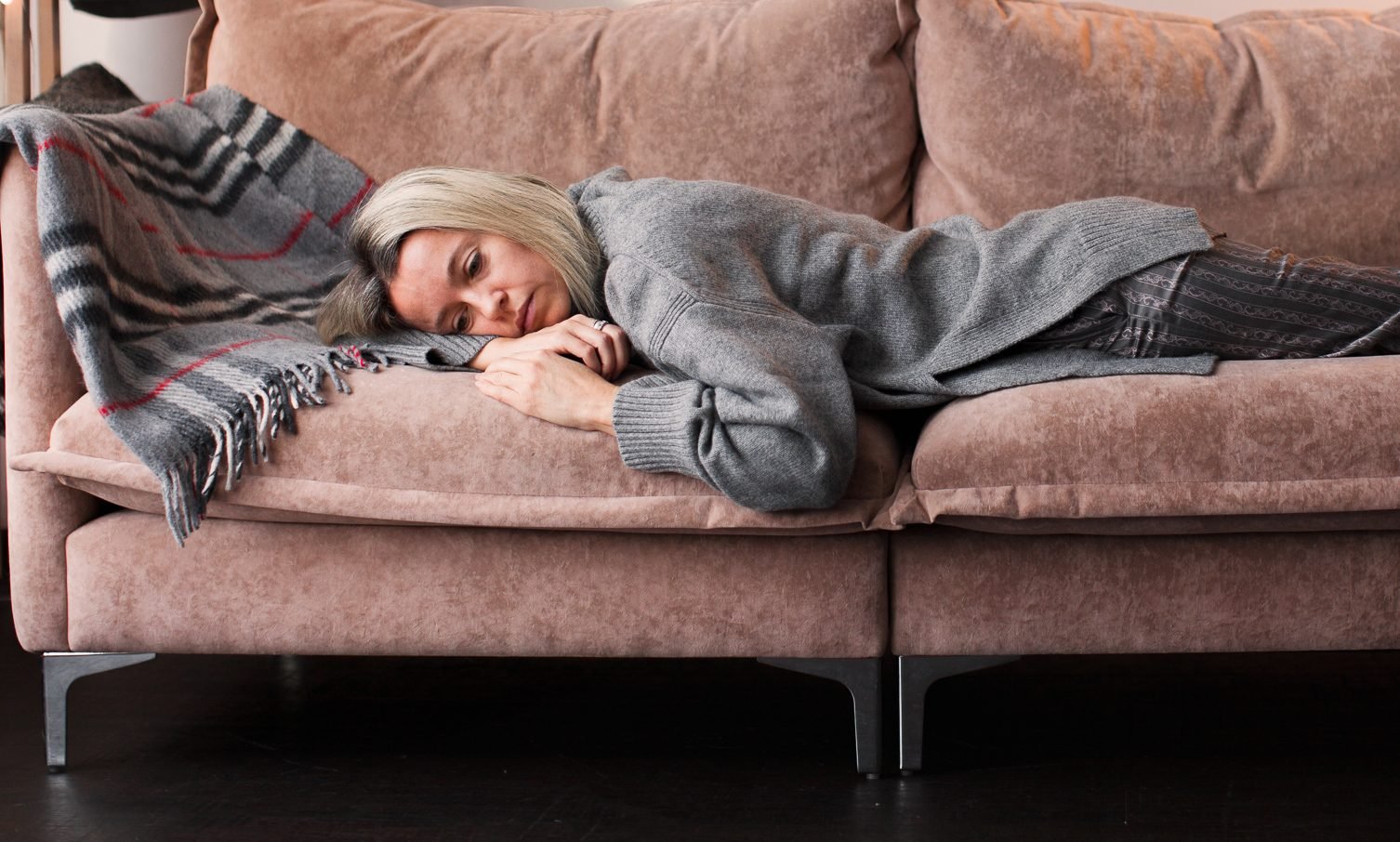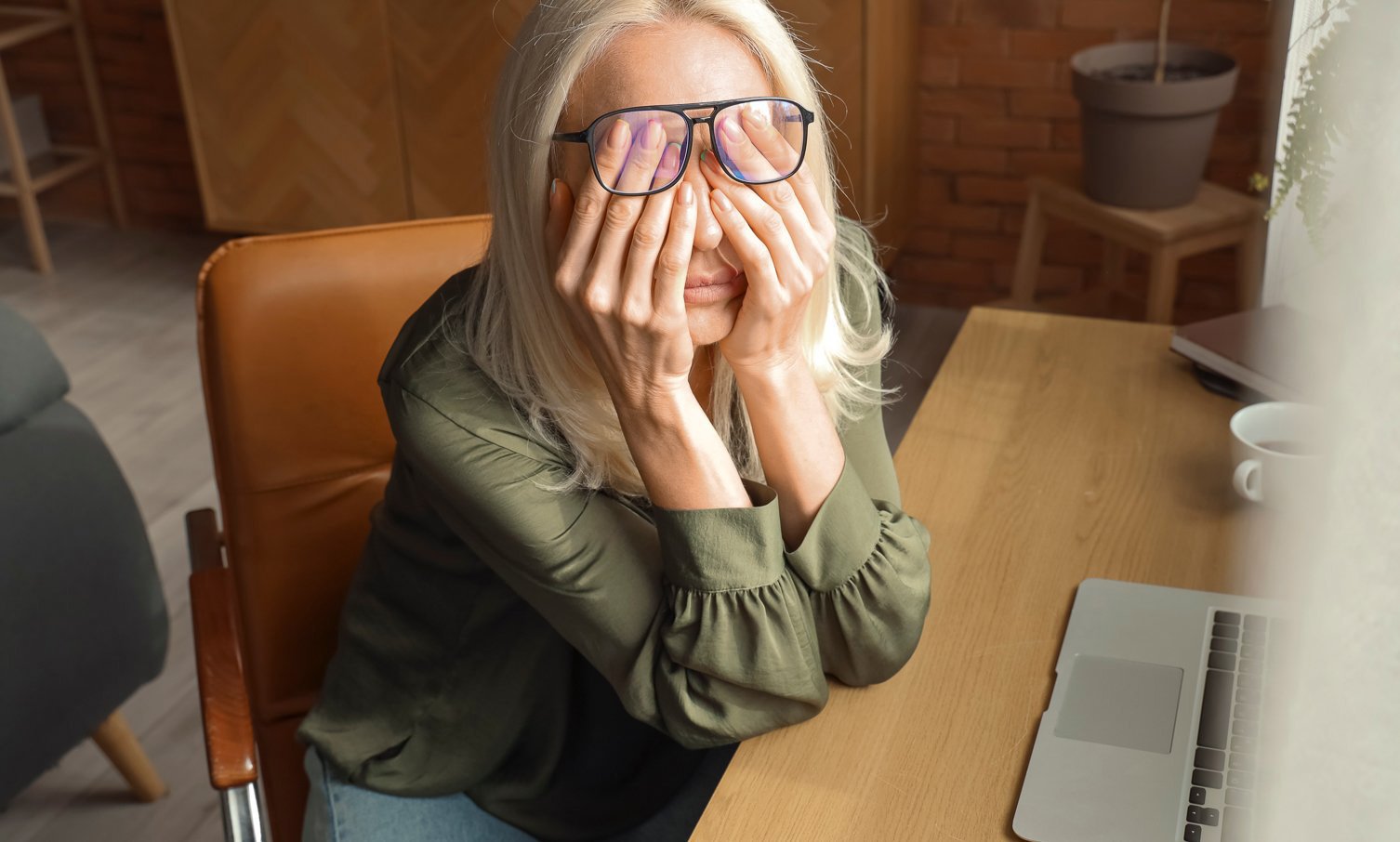Sleep Problems During Menopause: Here’s What Actually Helps
Reading time 8 min

Reading time 8 min

Physical symptoms may be only mildly bothersome for some, but for others, they can significantly interfere with daily activities1. According to studies, 60–86% of women seek medical help due to the severity of their symptoms2, 3.
Among the most frustrating are sleep problems during menopause, which can leave you exhausted, irritable, and searching for answers. The good news? There are effective strategies backed by science that can help manage the symptoms.
What causes sleep problems during menopause?
Sleep problems during menopause are often triggered by hormonal changes, hot flashes, mood shifts, and disrupted body temperature regulation. Lower estrogen and progesterone levels, along with lifestyle factors, contribute to difficulties falling asleep, staying asleep, and getting restful, restorative sleep.
I cover most significant symptoms and management tools in detail in separate articles under Healthy Body & Mind and Exercise & Nutrition.
Sleep disturbances are very common among women going through the menopausal transition and come in different forms. Between 33% and 57% of us are affected4.
Insomnia is frequent and characterized by difficulty falling asleep or staying asleep. Chronic insomnia is defined as occurring at least three times a week for three months. Many women experience frequent awakenings, which disrupt deep rest5, 6, 7.
Breathing-related issues also play a role. Restless legs syndrome (RLS) causes an uncomfortable urge to move the legs, which can interrupt sleep. Obstructive sleep apnea (OSA) involves temporary pauses in breathing due to relaxed throat muscles8, 9, 10.
In addition, menopausal women often spend less time in restorative sleep stages. These include stage 2, slow-wave sleep, and REM sleep, which are essential for mental and physical recovery. Together, these challenges make restful sleep difficult during our menopause transition11.
It’s not enough that we work hard during the day, we also don’t get enough rest at night!
Studies show that lower estrogen and higher follicle-stimulating hormone (FSH) levels increase sleep disturbances, including frequent awakenings and poorer sleep quality. Decreased estrogen and progesterone play a role here as well. They normally help regulate sleep and body temperature, promote relaxation, and even reduce wakefulness by blocking certain neurotransmitters in the brain.
Menopausal symptoms like hot flashes, night sweats, and mood changes also disrupt sleep. Hot flashes, for example, wake nearly 70% of women who experience them12. Mood disorders, such as anxiety or depression, are strongly linked to sleep problems as well13, 14.
Not all sleep disturbances are caused by menopause alone. Everyday factors like stress, weight, overall health, and even alcohol play a big role in sleep quality. Add to that frequent nighttime trips to the bathroom (nocturia) and the natural drop in melatonin as we age, and it’s clear that these can be just as impactful as the hormonal shifts of menopause15, 16.

Managing sleep problems during menopause often requires a combination of approaches. From medical treatments to lifestyle adjustments, the good news is that you have several options to improve your sleep quality and feel more rested.
Below, we’ll explore some of the most effective strategies, starting with medical therapies and moving into holistic methods you can integrate into your daily routine.
Low-dose HRT, like 0.5 mg oral estradiol and low-dose venlafaxine, has shown promising results in reducing insomnia and improving sleep quality17. Studies also suggest that combined estrogen-progesterone therapy can make a difference for those dealing with menopausal sleep disruptions18.
Both estradiol and conjugated estrogens (CEE) can improve sleep, with the skin patch working better than the pill. Adding micronized progesterone to your bedtime routine may help even more, as it has calming effects on the brain and reduces sleep disturbances better than other progesterone options. Together, these therapies are more effective than estrogen alone for improving sleep32.
Melatonin’s effects on sleep during menopause are still up for debate. While a meta-analysis found no clear benefits, recent studies suggest that melatonin might improve sleep, mood, and quality of life for some perimenopausal women without significant side effects.
The advice? Try a low dose (1-5 mg) about 2 hours before bedtime and see if it works for you19, 20, 21.
Taking whey protein isolate and omega-3 fatty acids together may help improve sleep quality and mood in postmenopausal women, although the results haven’t always been strong enough to confirm a significant effect22, 23.
Isoflavones (25 mg daily) and black cohosh show potential for improving sleep, though more research is needed24, 25.
Consider CBT-I, a well-supported approach to improving sleep. It’s not specific to menopause transitions but has been proven to be effective. CBT-I focuses on identifying and changing thoughts and behaviors that contribute to sleep problems. You learn to develop healthier sleep habits, manage stress, and create a bedtime routine that promotes relaxation. It’s even been shown to be more effective than sleep hygiene education alone26, 27.
Establishing a consistent routine can make a real difference in sleep quality, so try to go to bed and wake up at the same time every day.
During menopause, the risk of obstructive sleep apnea (OSA) rises, but it’s often overlooked because women’s symptoms can differ from men’s. While men with OSA usually have loud snoring and noticeable pauses in breathing, menopausal women are more likely to experience insomnia, fatigue, morning headaches, mood swings, or restless sleep instead of classic snoring.
This increased risk is partly due to the drop in hormones like progesterone, which helps support normal breathing. Recognizing sleep apnea as a hidden cause of sleep issues during menopause is key. Treating it not only improves your sleep but also reduces the risk of high blood pressure, heart disease, and other health problems. Addressing OSA can significantly enhance your overall health and quality of life during this transition30, 31.
Sleep during menopause often feels like an uphill battle – waking up drenched in sweat, tossing and turning with restless legs, or struggling with an overactive mind. It’s frustrating and exhausting. Hormonal changes, especially declining estrogen and progesterone, throw off our body’s natural ability to regulate sleep and relaxation.
Add to that the disruptive effects of hot flashes, mood swings, and even everyday factors like stress and frequent bathroom trips, and it’s no wonder sleep can feel elusive.
The good news? There are solutions. Hormone Replacement Therapy (HRT) remains one of the most effective ways to improve sleep disrupted by menopause. For those who prefer non-hormonal options, melatonin or supplements might help, though results can vary. Cognitive Behavioral Therapy for Insomnia (CBT-I) can be a game-changer for developing healthy sleep habits and managing stress.
Don’t underestimate the power of good sleep hygiene – cool, dark rooms, consistent bedtime routines, and less screen time before bed can make a world of difference.
Dr. Jūra Lašas
1.
Laine, C. et al. Menopause. (2009) https://doi.org/10.7326/0003-4819-150-7-200904070-01004
2.
Constantine, G. et al. Behaviours and attitudes influencing treatment decisions for menopausal symptoms in five European countries. (2016) https://doi.org/10.1177/2053369116632439
3.
Williams, R. et al. Healthcare seeking and treatment for menopausal symptoms in the United States. (2007) https://doi.org/10.1016/j.maturitas.2007.09.006
4.
Xu, Q. et al. Examining the relationship between subjective sleep disturbance and menopause: a systematic review and meta-analysis. (2014) https://doi.org/10.1097/GME.0000000000000240
5.
Baker, F. et al. Sleep problems during the menopausal transition: prevalence, impact, and management challenges. (2018) https://doi.org/10.2147/NSS.S125807
6.
Jeon, G. Insomnia in Postmenopausal Women: How to Approach and Treat It? (2024) https://doi.org/10.3390/jcm13020428
7.
Sateia, M. International classification of sleep disorders-third edition: highlights and modifications. (2014) https://doi.org/10.1378/chest.14-0970
8.
Bruyneel, M. Sleep disturbances in menopausal women: Aetiology and practical aspects. (2015) https://doi.org/10.1016/j.maturitas.2015.04.017
9.
Zolfaghari, S. et al. Effects of menopause on sleep quality and sleep disorders: Canadian Longitudinal Study on Aging. (2020) https://doi.org/10.1097/GME.0000000000001462
10.
Srisawart, P. et al. Cluster Analysis in Perimenopausal and Menopausal Women with Insomnia. (2020) https://doi.org/10.1093/sleep/zsaa056.460
11.
Virtanen, I. et al. Effect of external sleep disturbance on sleep architecture in perimenopausal and postmenopausal women. (2023) https://doi.org/10.1080/13697137.2022.2158727
12.
Zambotti, M. et al. Magnitude of the impact of hot flashes on sleep in perimenopausal women. (2014) http://dx.doi.org/10.1016/j.fertnstert.2014.08.016
13.
Carmen, M. et al.Relationship of sleep alterations with perimenopausal and postmenopausal symptoms. (2014) https://doi.org/10.1097/GME.0000000000000206
14.
Kloss, J. et al. Psychological Factors Associated With Sleep Disturbance Among Perimenopausal Women. (2004) https://doi.org/10.1207/s15402010bsm0204_1
15.
Lampio, L. et al. Predictors of sleep disturbance in menopausal transition. (2016) https://doi.org/10.1016/j.maturitas.2016.10.004
16.
Scholtens, R. et al. Physiological melatonin levels in healthy older people: A systematic review. (2016) https://doi.org/10.1016/j.jpsychores.2016.05.005
17.
Joffe, H. et al. Low-Dose Estradiol and the Serotonin-Norepinephrine Reuptake Inhibitor Venlafaxine for Vasomotor Symptoms: A Randomized Clinical Trial. (2014) https://doi.org/10.1001/jamainternmed.2014.1891
18.
Cheng, Y. et al. Pharmacologic and hormonal treatments for menopausal sleep disturbances: A network meta-analysis of 43 randomized controlled trials and 32,271 menopausal women. (2021) https://doi.org/10.1016/j.smrv.2021.101469
19.
Mingyu, Y. et al. Effects of exogenous melatonin on sleep quality and menopausal symptoms in menopausal women: a systematic review and meta-analysis of randomized controlled trials. (2021) https://doi.org/10.1097/GME.0000000000001757
20.
Zhang, J. et al. Influence of Melatonin Treatment on Emotion, Sleep, and Life Quality in Perimenopausal Women: A Clinical Study. (2023) https://doi.org/10.1155/2023/2198804
21.
Jehan, S. et al. Sleep, Melatonin, and the Menopausal Transition: What Are the Links? (2017) https://doi.org/10.5935/1984-0063.20170003
22.
Hawley, A. et al. The Impact of Supplementation With Whey Protein Isolate and/or Omega-3 Fatty Acids on Sleep and Mood in Postmenopausal Women (SHAPE Study). (2023) https://doi.org/10.1093/CDN/NZAB041_014
23.
Baum, J. et al. Protein and Omega-3 Polyunsaturated Fatty Acid Supplementation for 16 Weeks Improves Sleep and Mood States in Postmenopausal Women. (2020) https://doi.org/10.1093/cdn/nzaa040_009
24.
Polasek, D. et al. Nutritional interventions in treating menopause-related sleep disturbances: a systematic review. (2024) https://doi.org/10.1093/nutrit/nuad113
25.
Jiang, K. et al. Black cohosh improves objective sleep in postmenopausal women with sleep disturbance. (2015) https://doi.org/10.3109/13697137.2015.1042450
26.
Dopheide, J. Insomnia Overview: Epidemiology, Pathophysiology, Diagnosis and Monitoring, and Nonpharmacologic Therapy. (2020) https://doi.org/10.37765/ajmc.2020.42769
27.
Kalmbach, D. et al. Treating insomnia improves depression, maladaptive thinking, and hyperarousal in postmenopausal women: comparing cognitive-behavioral therapy for insomnia (CBTI), sleep restriction therapy, and sleep hygiene education. (2019) https://doi.org/10.1016/j.sleep.2018.11.019
28.
Nicolau, Z. et al. Can sleep hygiene behaviors improve sleep quality in midlife women? (2015) https://doi.org/10.1089/jwh.2014.5163
29.
Chung, K. et al. Sleep hygiene education as a treatment of insomnia: a systematic review and meta-analysis. (2018) https://doi.org/10.1093/fampra/cmx122
30.
Huang, T. et al. Type of Menopause, Age at Menopause, and Risk of Developing Obstructive Sleep Apnea in Postmenopausal Women. (2018) https://doi.org/10.1093/aje/kwy011
31.
Wimms, A. et al. Obstructive Sleep Apnea in Women: Specific Issues and Interventions. (2016) https://doi.org/10.1155/2016/1764837
32.
Pan, Z. et al. Different regimens of menopausal hormone therapy for improving sleep quality: a systematic review and meta-analysis. (2022) https://doi.org/10.1097/GME.0000000000001945
33.
Reid, K. et al. Effects of manipulating body temperature on sleep in postmenopausal women. (2021) https://doi.org/10.1016/j.sleep.2021.01.064
34.
Reid, K. et al. 0015 Manipulating Body Temperature: Effects on Sleep in Postmenopausal Women. (2020) https://doi.org/10.1093/sleep/zsaa056.014